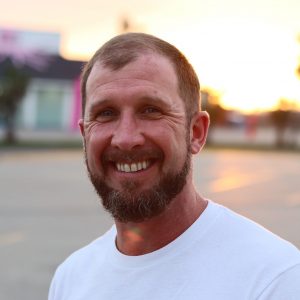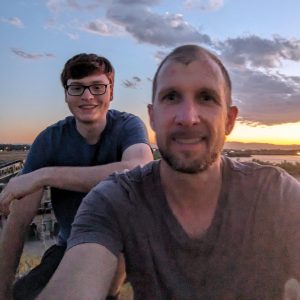Anthropology M.A., 2012
Anthropology B.A., Ethnic Studies minor, 2010

When Michael Brydge arrived at Colorado State University in 2007, he decided he wasn’t going to turn down any opportunities that came his way. A non-traditional student who grew up in a small town in Virginia’s Blue Ridge Mountains, Brydge took a liking to anthropology and the focus on cross-cultural understanding, and how applied anthropology offered empowerment for rural communities. When Professor of Cultural Anthropology Kathleen Pickering invited him and classmate, Andrea (Akers) Mader (Anthropology M.A., ’13; B.A. ’11), to travel to the Pine Ridge Indian Reservation to help with research and surveys, both students jumped at the offer.
“It was just a dream of mine to do this type of work,” Brydge said of the chance to contribute to research-based community development in rural and under-served areas. “Andrea and I were those type of people with immense dedication and zero care about what we were going to do that weekend. We were very dorked out! So, anytime there was a question, ‘Do you have time to do this extra project?’ we said ‘Yes!’ to everything. That led to building a massive amount of trust in our abilities from Kathy and also from the Indigenous organizations she was working for.”
When Pickering accepted a promotion to Vice Provost for Undergraduate Affairs in 2013, she made a new offer to Brydge and Mader. After getting buy-in from the several Indigenous organizations they were working with, Pickering asked her former students to take over her grants and projects – propelling them to start their own business, Sweet Grass Consulting. “That’s how it all started,” Brydge said. “Last year [2023] was our tenth year and we’ve brokered over 400 contracts, most of those with Indigenous Nations and Indigenous-led organizations.”
Brydge shared more about his journey and work with applied anthropology and supporting Indigenous community development.
Q&A with Michael Brydge
Tell us about what you and Sweet Grass Consulting do?
Andrea Mader and I are co-owners of Sweet Grass Consulting, based in Loveland, Colorado. I am Principal and Research Director. Andrea is Principal and Evaluation Director.
Sweet Grass is based on research, strategy, and evaluation. They’re three tiers, not silos, and they overlap all the time. The evaluation we do is usually a result of our strategic planning. Our research often has evaluation built within it or leads to organizations using our research to strategize for years to come. For all intents and purposes, I lead the research side of things.
Our requirements are working with economically burdened communities or organizations that work with those communities. We strive to build capacity and help people in economically burdened communities, and that’s been, by and large, Indigenous Nations.
Can you share some examples of your work?
What this might look like is: An entity calls and says, ‘We would like to do a housing needs assessment….’ We’ll say, ‘Great, we’ll assess the housing that you have… but we also want to use an asset-based approach to look at your strengths. We want to ask what you have to create viable housing for people and perhaps how to fold in workforce development. We do not check the box for ‘what type of housing is needed’ but instead take a housing ecosystem approach looking at childcare, entrepreneurship and business incubation, transportation, food sovereignty, and other elements that are needed for safe and affordable homes to thrive. Is there an economic multiplier of keeping dollars local, such as where a tribal construction company is building those houses?’
We provide that same approach and research with market studies for credit unions. We partner in some of the most economically impoverished counties in the nation, yet the majority of what people pay in bank interest goes to Wells Fargo in San Francisco, for example. Would it be beneficial for communities in very low populated, remote areas to have a credit union?
We’ve been doing a lot of feasibility and market studies on an Indigenous agriculture system, asking how can we revitalize, enhance, or create a regenerative agriculture system with the strengths they have. We’ll do the feasibility study, which will involve interviews, case studies, a community meal with focus groups or round tables, and a local survey and then put together financial projections as well.
Those are just a few examples of what the research arm looks like at Sweet Grass.

What is the most rewarding part of your work?
To see – all the way from the ultra-local and the individual level, to the community level, to regional, and even nationwide – Indigenous livelihoods becoming better and better, and people and organizations finally getting things that they have deserved for many, many years.
Some of that is because governments are starting to honor them and treat them with dignity, and some of it is because the immense amount of sacrifice and hard work that people are putting in. My greatest reward is to see that happen and then also to be continually trusted and invited to be a part of those processes, to assist with that trajectory. It’s phenomenal.
What knowledge or skills from your degree have been most useful at your job?
It’s two things. The first is [having learned] how to go and find out the information that’s often difficult to find out using participatory research methods.
There are certain people that think we’re experts at subject matter and we’re really not. We just know how to find out what we need to on different subject matters, to inform the people we are partnering with so they can make data-informed decisions for the ‘here and now’ and for generations to come. Using participatory methods, we have communities and organizations set their own outcomes, share what they desire, help to conduct the research, and collect the information. Then we help organizations measure and achieve those metrics.
Number two is… the importance of cultural relativism, which you learn the first week of anthropology: That the way we learned to do things is not the only way and sometimes may not even be the right way. So, learning how to tease that apart and to understand other cultures, practices, views, and even when you don’t understand or agree, to be able to have respect and treat each other with dignity.
Those are the two biggest takeaways.
Building on that, is there a specific class or experience at CSU that was especially formative?
Working with Dr. Pickering and all of her classes … almost every course I had with Kathy, she had me working with something that was real life and tangible, or she allowed me to integrate what was important to the communities we were working in into my coursework. And that’s just incredible.
In Participatory Monitoring and Evaluation (ANTH 449), we took the evaluation skills that we were learning and reading about and the entire class had a group project of doing monitoring and evaluation on the Northern Colorado Powwow. That was the first time they had ever received any type of reporting evaluation and the data led them to get grants. In return, they blessed us, and it led to two people getting a star quilt and each of us in the class getting a Pendleton blanket. That was super cool and kind of set the stage for a lot of the work we do at my company.
Also, I always appreciated Dr. Mary Van Buren. I was never really into archaeology, but I had several classes with her. She made archaeology relevant to my passion of working with community and economic development in the 21st century. She spoke to me like a human being — with humor, respect, and understanding. Having never been to a university before [coming to CSU], she made me feel welcome and warm.
What are you most proud of since graduating from CSU?
For sure, creating this business. I never knew something like this even existed, and certainly never thought some kid from the Blue Ridge Mountains of Virginia would be engaged in this work.
My greatest reward is to see Indigenous livelihoods becoming better and better, and people and organizations finally getting things that they have deserved for many, many years. …to see that happen and then also to be continually trusted and invited to be a part of those processes, to assist with that trajectory… It’s phenomenal.
What do you do outside of work for fun?
Well, I’m quitting soccer after 14 years – definitely the veteran of the team! But we won a championship this year so it feels like a good time to call it good! I’ll probably continue practicing and running with those guys, but now I can keep my Sundays open. I’ve always kept a large garden and now I have various fruit trees as well.
I did just start kayaking but I haven’t done a lot of it yet. Then, mountain biking and, really, just laughing and telling stories and eating with my 21-year-old twin sons, along with my new wife Nancy and children.